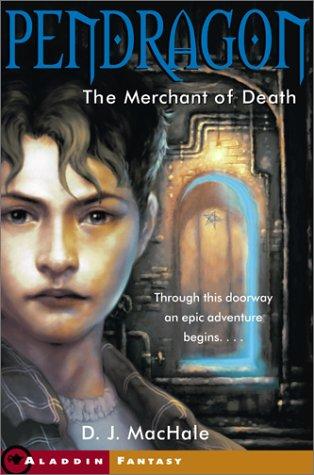lux ⛥ reviewed The Merchant of Death by D. J. MacHale (Pendragon (1))
Review of 'The Merchant of Death' on 'Goodreads'
5 stars
I find it only fitting that my return to book reviewing begins with the series that started it all. About ten years ago, in the midst of my early teendom, I stumbled upon this little gem of a novel by D.J. MacHale. The Merchant of Death became the catalyst for my interest in YA fiction and kindled a passion for sharing my thoughts on the many novels I voraciously read. You could even say that the Pendragon series as a whole marked the embarkation of my journey through website building, blogging, and written commentary.
The inspiration was so thorough that I begin a fan club for the series, appropriately called Dark Matter. (For those familiar with Pendragon lore, you will know what I’m talking about!) The site evolved into an all-encompassing book club and eventually became my stepping-stone into the wider world of book reviewing and spiritual pondering. I don’t know why I never got around to a proper review for the books in this legendary series. They were certainly formative to the imagination and creativity of thirteen-year-old Ty. Perhaps, knowing how special they were to me, I was afraid of failing to do them justice. Well, a different state of mind and a decade later, I’ve decided to remedy that. And so, without further ado…. Hobey-ho, let’s go!
Like many of my favorites in the genre of YA fiction, The Merchant of Death is approachable to a wide array of ages. Contrary to what some might think, I value brevity and inclusivity of speech over obtuse language. The ability to reach a larger audience is sometimes more valuable than catering to the literary minded. In this case, The Merchant of Death succeeds by not alienating those of a younger age group who would benefit most from the themes of life it presents. But of course, one could argue this praise is better directed to the genre at large. My point is that some books are hastily judged by their intended audience instead of the potential universality of their content.
The greatest aspect of this approachability I keep waxing on about is the relatability of the protagonist, Bobby Pendragon. As a perfectly ordinary teen who is thrust into extraordinary circumstances, we are coaxed into reflecting upon our own life and the seemingly uncontrollable events of our own destiny. Many of the trials and tribulations Bobby faces mirror our own struggles, albeit embellished by fantasy. We see him endure the loss of his old life, a shattering of preconceived beliefs about reality, and his trust in important life figures put to the test. But most importantly, we see him make mistakes and endure the consequences of his actions.
By resisting his destiny and the call to do what is right, Bobby inadvertently causes the death of someone who was trying to protect him. The ripple effect of this mistake shapes the entirety of his proceeding journey. Whereas before he had a protector and a guide, now he and his comrades are more alone than ever. But as you will see later on, in a matter of fate, this occurrence was necessary for Bobby to confront his own selfish desires and rise to the occasion of fulfilling his greater destiny.
The character development of the protagonist witnessed in the first novel of this series alone is enough to continue reading. There is a bit of a redemption arc in here as we learn that Bobby forgives himself for being afraid of his destiny. His mistakes were a direct effect of fearing his newfound responsibility to the welfare of an entire people and civilization. By overcoming his fear and riding the waves of fate, he was able to save the lives of hundreds of people and become a better person in the process. As we see at the end of this particular journey, he marks this realization with a telling statement:
"I feel as if I learned a few things. I learned that it’s sometimes okay to think like a weenie, so long as you don’t act like one—at least not all the time. I learned that it’s okay to be wrong, so long as you can admit it and are willing to listen to those who may know better."
As already hinted at, a major allusion of The Merchant of Death is the great tapestry of fate that is woven out of an unpredictable pattern of causes and effects. The theme of providence or a higher order guiding one’s destiny is prevalent at every turn. Where Bobby’s mistakes seem to be terrible setbacks, they are in fact serving a greater and unseen purpose. It encourages one to have faith that everything will turn out alright, even if it seems impossible at the current time. As the credo of the mysterious Travelers in the series goes, “This is the way it was meant to be.”
In a nutshell: D.J. MacHale embarked upon an epic and wholesome journey with The Merchant of Death. There is so much more I wish to say about this series, but I must save some musings for my reviews on the proceeding novels. I tried to keep plot specifics as vague as possible so you can find out more for yourself! As a very formative read in my early years, I can’t give this fantastic story enough praise. Filled with themes of friendship, destiny, and redemption, there is enough food for thought to satisfy the appetite of any reader.

